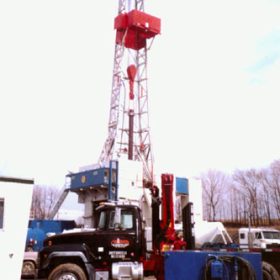
| Application | Gas Storage Well |
|---|---|
| Location | Pennsylvania, Eastern USA |
| Hammer | Champion RC300 and Champion 240 |
| Bit | PolyCrystalline Diamond (PCD) Carbide Bit |
| Hole Size | 39 inches (991 mm), 34 inches (864 mm), 28-1/2 inches (724 mm), 24 inches (610 mm) |
| Depth or Length | 3,896 feet (1,188 meters) |
| Formation | Shale, Sandstone, Limestone |
| Rig Type | National EU 1320 Diesel Electric |
Description
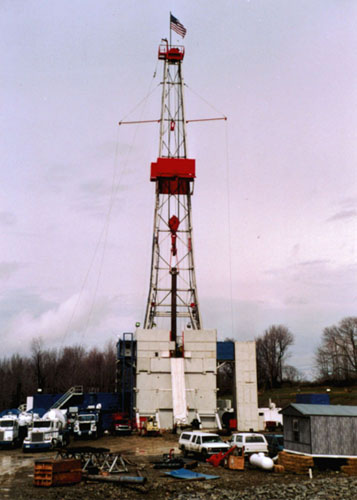 In southeastern Pennsylvania, Numa’s Champion 240 hammer and PolyCrystalline Diamond (PCD) Carbide Bits have successfully completed the deepest large diameter hole ever drilled with a down hole hammer and bit – drilling an amazing 3,896 feet (1188 m).
In southeastern Pennsylvania, Numa’s Champion 240 hammer and PolyCrystalline Diamond (PCD) Carbide Bits have successfully completed the deepest large diameter hole ever drilled with a down hole hammer and bit – drilling an amazing 3,896 feet (1188 m).
The deep hole drilling was performed by drilling contractor, Rowan of Houston, TX, for a gas storage well in Tioga, PA that has been constructed by NE Market Hub. A number of other parties also assisted with the project to insure the completion of the wells in a safe and efficient manner including technical consultants Al Owings, Tom Weller and Jim Browning from Continuous Operations Incorporated (COI) of Houston, TX, Bill Lahew from Numa distributor Bill’s Bit Service of Smithfield, PA, Tom Siguaw from Market Hub Partners and Numa Regional Manager Carl Chidester.
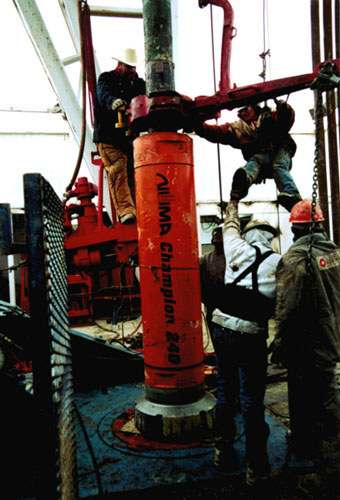 The Numa PolyCrystalline Diamond (PCD) Carbide Bit was chosen because it was specially designed for oil and gas drilling applications consisting of highly abrasive and medium hard rock formations. Due to its special characteristics, the diamond carbide has many benefits over standard carbide. The PCD carbide is 3 to 5 times harder, 100% more wear resistant and has a compressive strength that is 115% stronger than standard carbide. All of this provides a longer lasting bit that is able to continue drilling where a standard carbide would need to be replaced or repaired several times during this one hole. Due to the increased strength and wear resistance of Numa’s PCD carbide, the bits will not lose gauge size and can continue drilling. This provides substantial cost savings because it significantly reduces the requirements to trip in and out of the hole to check the bit for damage or excessive wear. The PCD bits allow operators to run DTH products longer and deeper.
The Numa PolyCrystalline Diamond (PCD) Carbide Bit was chosen because it was specially designed for oil and gas drilling applications consisting of highly abrasive and medium hard rock formations. Due to its special characteristics, the diamond carbide has many benefits over standard carbide. The PCD carbide is 3 to 5 times harder, 100% more wear resistant and has a compressive strength that is 115% stronger than standard carbide. All of this provides a longer lasting bit that is able to continue drilling where a standard carbide would need to be replaced or repaired several times during this one hole. Due to the increased strength and wear resistance of Numa’s PCD carbide, the bits will not lose gauge size and can continue drilling. This provides substantial cost savings because it significantly reduces the requirements to trip in and out of the hole to check the bit for damage or excessive wear. The PCD bits allow operators to run DTH products longer and deeper.
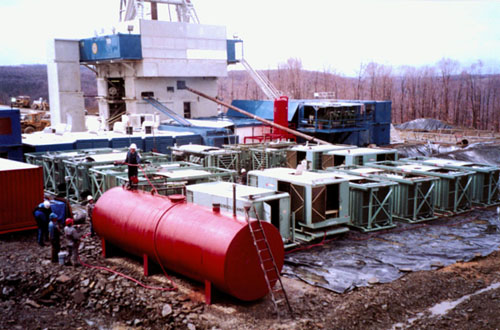 A hole this deep required a large volume of air to efficiently clean the hole. Weatherford Inc. from Houston, TX was contracted to supply and service over 13,000 CFM (6136 l/sec) of deliverable air from many different compressors which were run behind 5 two-stage boosters. Since such a large air volume could not be run totally through the hammer, a ported sub with 2 – 1 inch (25.4 mm) diameter holes was run directly above the hammer that was fitted with a 3/4 inch (19.05 mm) choke for the 28-1/2 inch (724 mm) bit and a 5/8 inch (15.88 mm) choke for the 24 inch (610 mm) bit. When the drilling of the 28-1/2 inch (724 mm) hole began, airflow monitors showed that the actual air volumes were between 10,000 and 10,500 CFM (4720 & 4956 l/sec) going down the hole. Drilling pressures ran between 590 PSI to 630 PSI (40 – 43 bar).
A hole this deep required a large volume of air to efficiently clean the hole. Weatherford Inc. from Houston, TX was contracted to supply and service over 13,000 CFM (6136 l/sec) of deliverable air from many different compressors which were run behind 5 two-stage boosters. Since such a large air volume could not be run totally through the hammer, a ported sub with 2 – 1 inch (25.4 mm) diameter holes was run directly above the hammer that was fitted with a 3/4 inch (19.05 mm) choke for the 28-1/2 inch (724 mm) bit and a 5/8 inch (15.88 mm) choke for the 24 inch (610 mm) bit. When the drilling of the 28-1/2 inch (724 mm) hole began, airflow monitors showed that the actual air volumes were between 10,000 and 10,500 CFM (4720 & 4956 l/sec) going down the hole. Drilling pressures ran between 590 PSI to 630 PSI (40 – 43 bar).
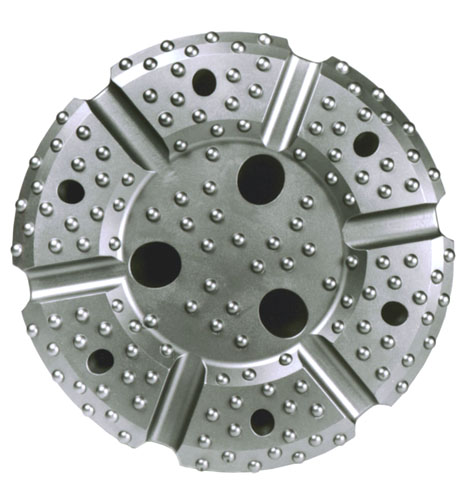
The project employed a telescopic drilling process with holes reducing in size from 39 inches (991 mm) to 24 inches (610 mm). At the outset, a Numa Champion RC300 hammer was fitted with a 39 inch (991mm) bit and drilled the first 80 feet (24.4 m) of the hole. A 34′ (864 mm) bit was then installed in the RC300 hammer to drill down to 753 feet (230 m) where a conventional DTH hammer was used to complete the second and third phases of the drilling.
The reverse circulation drilling method provides an environmentally sensitive alternative that can eliminate traditional hole cleaning problems. Reverse circulation drilling utilizes dual wall drill pipe and high pressure air to efficiently clean the hole. The principles of RC drilling and dual wall pipe are fairly simple. Air is forced down the annular space between the outer and inner pipe and is exhausted out the outer edge of the RC bit. All cuttings and down hole samples are then forced (vacuumed) back up through the center of the bit and inner pipe (collection tube) to be safely collected and discarded at the surface. With this method, no foam is required to clean the hole and lubricants are not free to contaminate the formation.
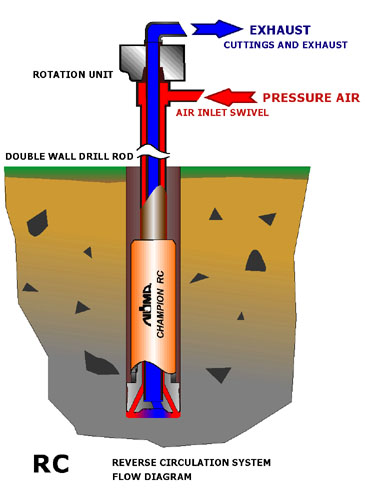 The second phase utilized a Numa Champion 240 hammer with a PCD carbide bit to drill a 28-1/2 inch (724 mm) diameter hole to install 26 inch (660 mm) diameter casing. During this phase, the hammer and bit drilled flawlessly through a formation consisting of shale, sandstone and limestone to a depth of 2,272 feet (693 m). Penetration rates in these conditions were 60 FPH (18.3 MPH) with an overall drilling time averaging 25 FPH (7.6 MPH). The hole was drilled dry, so cleaning this large diameter hole at this depth was no problem.
The second phase utilized a Numa Champion 240 hammer with a PCD carbide bit to drill a 28-1/2 inch (724 mm) diameter hole to install 26 inch (660 mm) diameter casing. During this phase, the hammer and bit drilled flawlessly through a formation consisting of shale, sandstone and limestone to a depth of 2,272 feet (693 m). Penetration rates in these conditions were 60 FPH (18.3 MPH) with an overall drilling time averaging 25 FPH (7.6 MPH). The hole was drilled dry, so cleaning this large diameter hole at this depth was no problem.
For the third phase, a 24 inch (610 mm) PCD carbide bit was installed in the Champion 240 hammer and the choke size was changed from 3/4 inch (19.05 mm) to 5/8 inch (15.9 mm). The hammer and bit was tripped in the 2,272 feet (693 m) hole and continued drilling without incident through additional layers of shale, sandstone and limestone to install 20 inch (508 mm) casing to a total depth of 3,896 feet (1188 m). Penetration rates during this portion of the drilling averaged 80 FPH (24.4 MPH) with an overall drilling time of over 45 FPH (13.7 MPH).
Once reaching 3,896 feet (1188 m), FERC (Federal Energy Regulatory Committee) requirements dictated that the drilling be switched from DTH to fluid and roller bit. The hammer was tripped out of the hole and a 24 inch (610 mm) roller bit was tripped in. Drilling continued at an average rate of 8 FPH (2.4 MPH) until a total depth of 5,996 feet (1829 m) was reached.
Overall performance of the Champion RC300, Champion 240 and PCD carbide was outstanding during the drilling of this record-making hole. The hammer and bit combined to achieve tremendous penetration rates and both the 28-1/2 inch and 24 inch (724 and 610 mm) PCD carbide bits showed minimal wear. Furthermore, deviation to a total depth of 3,896 feet (1188 m) was less than 1/2°. To achieve such a depth for such a large diameter hole demonstrates how Numa’s know-how and products help you get to the bottom of each hole faster and smarter.
Get to the bottom of it with Numa.


